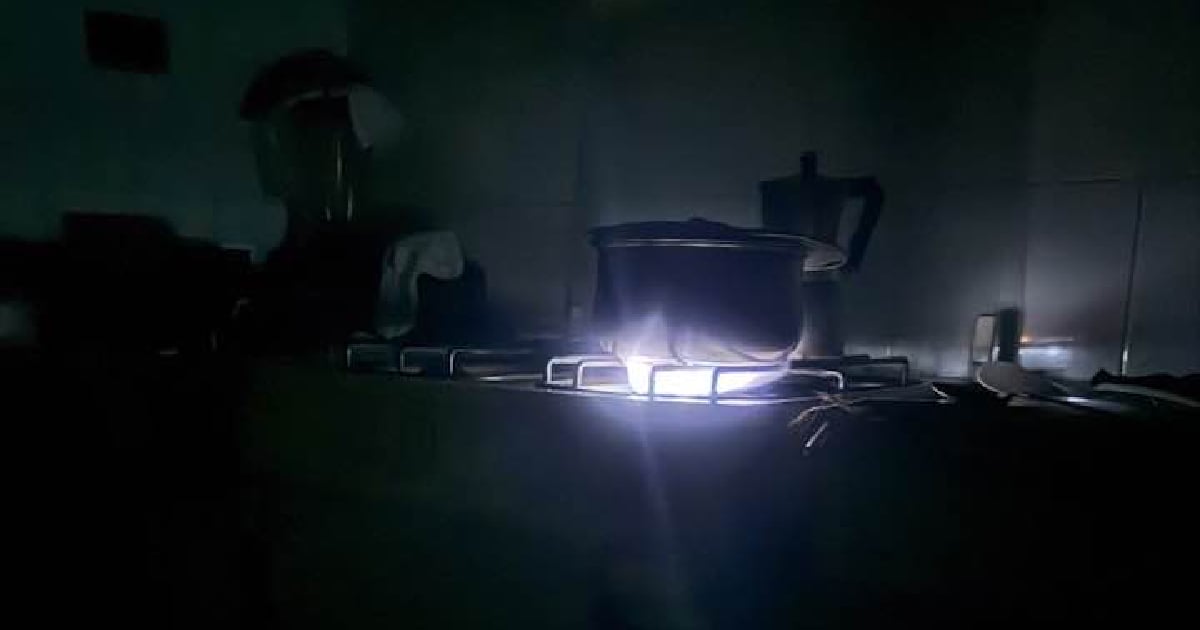
The daily tragedy faced by millions of Cubans on the island, deprived of the most basic means of survival, is brought to light every day in virtual spaces, where the population and prominent figures in society raise their voices against the reality that suffocates them and threatens to take away their last breath.
Father Lester Rafael Zayas Díaz, a priest at the Parish Church of the Holy Trinity in the province of Sancti Spíritus, shared a poignant reflection with parishioners and followers that highlights the critical context in which the people of Cuba are surviving.
"Today, while I was making my soup in the darkness lit only by the gas stove, I thought: what about those who don’t have gas? And those who don’t have soup? What about those who don’t even have a phone to capture that moment of immense bravado, cooking in the middle of nowhere? What about those who don’t have water? And those who don’t have a voice? And those who are afraid?" the priest pondered, concerned about the hardships faced by the vulnerable and resource-deprived population amidst the country’s worst crisis and the inability to express themselves freely for fear of the regime's repression.
"No, I do not consider myself privileged in the light of this stove while my soup is boiling. Rather, I feel part of a deep silence and a great pain that is killing us," the priest confessed during his meditation, reflecting on the hardships currently facing Cubans: food shortages, constant blackouts, lack of water and fuel for cooking, scarcity of medicine, and inadequate medical care…
His heart-wrenching words resonated with dozens of people who reacted or expressed their agreement with the religious leader's message.
"And what about those who have nothing???? Here, no one has anything - obviously, the people - we have been deprived of life; that's the first thing we lack," emphasized a woman.
"I ask those questions too. People are dying," lamented one, to which a third responded: "We are all dying, even those of us with a little more. The struggle for survival wears us down."
Meanwhile, hopeful that the times of misery in Cuba will come to an end once and for all, two men did not hesitate to state, "The night will not be eternal."
Father Zayas, who served until July at the Sacred Heart of Jesus Parish in Vedado, Havana, reported repeated thefts and acts of vandalism at the temple, likely aimed solely at intimidating him, as he is one of the church figures critical of the ills and problems facing the country and the hardships endured by the people.
Zayas was one of the 15 Catholic priests who signed a petition against repression in 2021, ahead of the Civic March for Change organized by the Archipiélago platform for November 15. He has been one of the representatives of the Cuban church monitored by State Security.
In his homily on December 24, 2023, Christmas Eve, he was unequivocal in stating that he is not “a political priest” and made it clear that his interests do not include such aspirations. However, he could not avoid addressing the harsh realities of Cuba during his mass, as it is in reality that one encounters God.
On that occasion, he expressed his doubt about what to say to a people living in darkness and despair. "I confess something to you, perhaps this homily is the hardest for me to deliver since I began my priestly ministry. What can one say to a despairing people, in light of the Gospel of Jesus Christ?" he wondered.
“What is real hurts us, reality weighs on us, and what we face is a struggle. (...) God came into a world in crisis and continues to come into a world in crisis. Crises make us strong; they help us recognize the value of what is truly meaningful,” he emphasized.
Almost a year after the vibrant homily of the Catholic priest, the crisis in Cuba has reached alarming levels, impacting every aspect of daily life for its citizens. From constant and prolonged blackouts—more accurately described as "lightouts"—to shortages of food, medicine, and even potable water; rampant inflation; rising crime and insecurity; and political repression that restricts freedom of expression, the country is experiencing one of the worst socioeconomic situations in decades.
Cubans are trapped in a suffocating landscape of misery and despair. Economic and social conditions deteriorate further each day, with a system and leaders unable to provide the most basic necessities, solve problems, and halt the country’s decline.
Many have found in migration the only escape from their suffering, and they have led the largest exodus in Cuban history. Today, hundreds of thousands of Cubans are seeking opportunities in other countries that the socialist regime imposed on the nation denies them. Meanwhile, the voices of protest that emerge within the island are swiftly silenced by an illegitimate regime that clings to power.
Filed under: